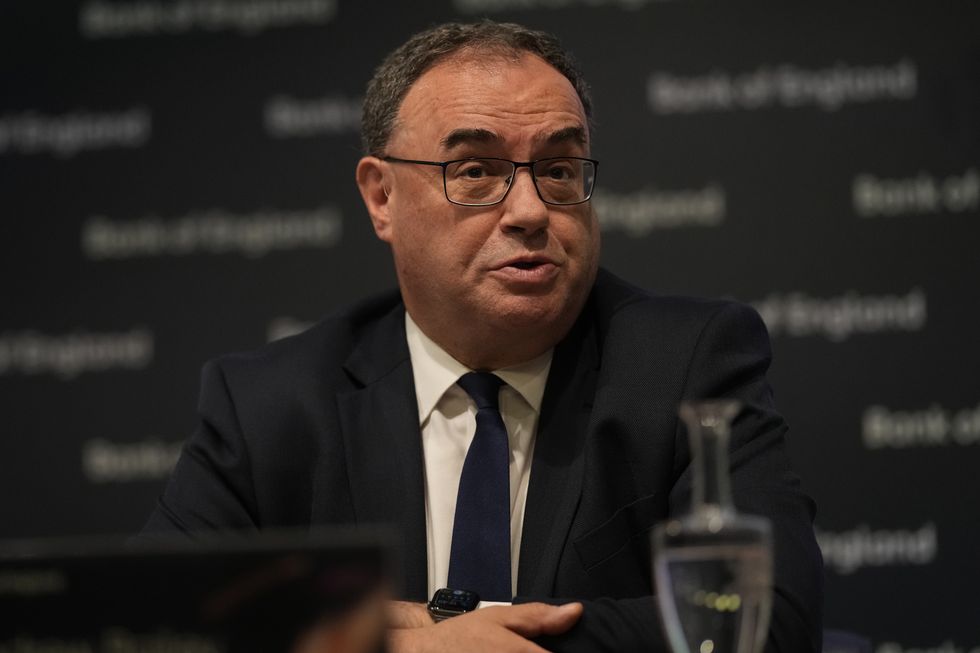The Bank of England base rate has fallen to 4.75 per cent
GETTY
The Bank of England base rate has fallen to 4.75 per cent
Don't Miss
Most Read
Trending on GB News
The Bank of England's recent decision to reduce the base interest rate marks a significant shift in monetary policy, with wide-ranging implications for personal finances.
Here's how this change may affect various aspects of one's financial life:
Mortgages
A drop in interest rates to 4.75 per cent will be "music to the ears" of borrowers across the country.
The decision will be a welcome relief for those that are approaching a remortgage or looking to buy their first home and those who want to take on additional borrowing in the coming months.
Holly Tomlinson, financial planner at Quilter said: "Now that the rate cut has been implemented, lenders are likely to reintroduce fixed-rate products, potentially at more competitive rates.
"Homeowners with variable-rate or tracker mortgages may see immediate reductions in their monthly payments, while those nearing the end of fixed-rate terms should monitor the market closely to refinance at favourable rates."

A drop in interest rates to 4.75 per cent will be "music to the ears" of borrowers across the country
PAThose locked into expensive fixed-rate deals or coming off cheaper rates secured before Bank of England rate hikes will face increased repayments. However, Alice Haine, Personal Finance Analyst at Bestinvest explained that these payment increases "may not be as heavy as anticipated".
She warned: "One concern for those looking to refinance soon is that mortgage rates may not behave exactly as they would like them to.
"Rising bond yields in the wake of the Budget and the US election have impacted swap rates, which underpin mortgage pricing, with some lenders recently upping rates despite an expected interest rate cut.
"Swap rates can be volatile, as they are essentially based on what markets think will happen to interest rates, so whether the markets settle in the coming days and weeks will determine what happens to mortgage rates from here."
For borrowers nearing the end of their fixed terms, the choice between fixed-rate and tracker mortgages requires careful consideration.
Haine emphasises that seeking advice from an independent mortgage broker is crucial to avoid defaulting to lenders' standard variable rates, which currently average nearly eight per cent.
LATEST DEVELOPMENTS:
Savings
While borrowers benefit from lower interest rates, savers may experience reduced returns on their deposits.
Historically, banks and building societies have been slow to pass on rate increases to savers but are often quicker to reduce rates following a base rate cut. Therefore, experts urge savers to "act promptly" to secure competitive rates before they potentially drop.
Holly Tomlinson, financial planner at Quilter said: "Currently, there are still some accounts paying as much as seven per cent. These won’t be around for long so having a careful look at your finances sooner rather than later is worthwhile."
Haine added: "With saving rates above the five per cent mark becoming increasingly rare, those with cash to spare should act now to secure bumper returns."
She warns that money not working hard will erode over time once inflation is factored in, making it crucial for savers to lock in higher rates while they're still available.
The Government's decision to freeze the ISA allowance at £20,000 for the next six years adds further pressure on savers to be strategic with their money. This freeze, combined with other personal tax threshold freezes, means more people will see their income and investment returns impacted by tax as their earnings rise.
The Personal Savings Allowance remains unchanged following the recent Budget, creating additional challenges for savers with substantial deposits as they face potential tax on their interest earnings. For those looking to make the most of their tax-efficient savings, choosing the right type of ISA is crucial.
"Cash ISAs can work well for short-term savings goals, such as a wedding or dream holiday," advises Haine. However, she notes these are less beneficial for savers seeking inflation-beating returns over the longer term.
For investors with a time horizon of at least five years, a Stocks & Shares ISA is more likely to achieve better returns.
Pensions
Tomlinson explains that annuity rates are closely tied to government bond yields, which can be influenced by changes in interest rates.
She said: "A reduction in the base rate may lead to lower bond yields, potentially resulting in less favourable annuity rates for retirees.
"Those nearing retirement should consult with a financial adviser to assess the timing of annuity purchases and explore other retirement income options."
Household debt
Individuals with personal loans or other forms of debt may find that lower interest rates reduce their borrowing costs.
Tomlinson said: "This environment presents an opportunity to pay down existing debts more efficiently or refinance at lower rates. Implementing a structured debt repayment plan can help take advantage of the reduced interest burden."
Haine added: "Add in Reeves’s raft of tax rises in the Budget and the effect of fiscal drag on people’s take-home pay, a result of frozen personal tax thresholds with more people paying higher rates of tax as their income increases, and, for many, balancing the books may still be a struggle.
"Consumers should not consider a second interest rate cut as the signal to rush out and spend big in the run-up to Christmas.
"Running down emergency funds or borrowing to fund a major lifestyle cost should always be considered carefully to ensure repayments are fully affordable, and with the cost of servicing debt, such as loans, overdrafts and credit cards, still high, plans for major purchases placed on pause amid affordability concerns should ideally remain so."







